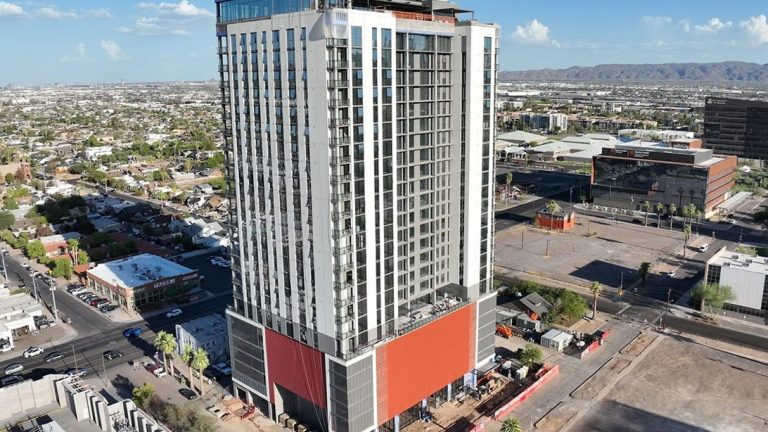Despite rising interest rates and more listings on the market, Phoenix’s housing scene is experiencing a shift. While not among the top competitive markets in 2025, the city still offers opportunities for buyers with increased inventory and price adjustments. Let’s explore the factors shaping Phoenix’s current real estate landscape.
Key Influencing Factors for the Phoenix Housing Market
There are several factors that keep the Phoenix housing market attractive:
Economic Drivers:
- Lower Taxes: Arizona doesn’t tax Social Security and keeps property taxes lower than cities like LA or Denver. This makes it an attractive option for both buyers and investors.
- Cost of Living: Phoenix is more affordable than the other large coastal cities like New York.
- Job Opportunities: Big employers like Intel, TSMC, Amazon, and Banner Health are expanding their presence in Phoenix. This creates employment opportunities that attract new residents to Phoenix.
- Remote Work: Phoenix has seen growth in flexible workplaces recently. This makes it easier for people to move somewhere sunny with more space—like Phoenix.
Legal Factors:
- Zoning Regulations: These laws determine land use and can limit housing density. Changes, like higher density allowances, can increase supply and lower prices in Phoenix.
- Building Codes: Strict codes can boost long-term property value and safety.
- Environmental Regulations: In Phoenix, water restrictions can limit certain projects and raise construction costs.
- Landlord-Tenant Laws: Rent control can limit landlord income, affecting rental investment and rates in Phoenix. For instance, the March 2025 RealPage’s lawsuit alleges rent-setting algorithms inflated rents in Phoenix and beyond. If proven, it could impact investor strategies in multifamily real estate.
Other Major Drivers:
- Interstate Migration: Arizona ranked top 3 in inbound moves in 2024, mainly from states like California and Illinois, where homes cost more.
- Transportation Upgrades: The new South Central Extension/Downtown Hub light rail extension has made commuting easier. This has led to increased buyer interest in neighborhoods with improved transit access.
- Active Lifestyle: Phoenix gets almost daily sunshine, with plenty of space for outdoor activities like mountain trails and golf courses. This attracts buyers who enjoy an active lifestyle.
How Can You Avoid Overpaying in Phoenix?
Smart planning can give you an edge regardless of the market you invest in. Here are some strategies that can help you save more investing in homes for sale in Phoenix:
- Get Pre-Approved: Sellers prioritize buyers with pre-approval letters.
- Use MLS Alerts: Many platforms allow you to filter searches by price, zip code, and school district.
- Track Price Drops: Keep an eye on homes that have seen price reductions over the past 30 days. These sellers may be more motivated to negotiate, offering an opportunity for a better deal.
- Compare Recent Sales: To get a sense of whether a home is fairly priced, compare it with at least three recent sales in the same neighborhood. This will help you understand the going rates in the area.
- Check Price-Per-Square-Foot: Evaluate the price-per-square-foot for similar homes in the area. This gives you a clearer benchmark to determine if a listing is priced competitively.
- Move Fast: Phoenix has neighborhoods that are highly competitive, with fast turnover. Act within 24 hours of new listings and work with local agents who know Phoenix’s fast-moving neighborhoods.
Which Phoenix Neighborhoods Are in Demand?
Even with more listings, certain neighborhoods continue to see strong demand:
- Arcadia: This area is known for its luxury homes with stunning mountain views. Homes in this area typically start around $1.6 million and can go much higher depending on the size and amenities.
- North Central Corridor: This neighborhood blends older homes with modern updates and is popular for its walkability and proximity to trendy shops and restaurants. Homes here are priced around $1.3 million, which makes it a desirable spot for buyers seeking a mix of charm and convenience.
- Desert Ridge: This is a newer development with modern homes, close to shopping centers, and recreational areas. The average price for homes in Desert Ridge is about $760,000, making it an appealing choice for families looking for newer construction at a relatively affordable price point.
- Maryvale: This area is one of the more affordable options in Phoenix, with homes priced around $350,000. It’s a solid choice for first-time homebuyers who look for value without breaking the bank.
Should You Use Real-Time Search Tools?
Yes, with a fast-moving market, using smart tools helps you stay ahead. Platforms like Houzeo offer real-time alerts, saved searches, and instant chat with agents. The filters let you sort by property type, neighborhood, and even listing age, so you can track price reductions, tour homes virtually, and stay ahead of the competition.
👉 Check out the best homes for sale in Arizona now on Houzeo and book a showing today.
Should You Buy in Phoenix Now?
Not every market shift spells disaster, like the Phoenix housing market shift. If you stay alert, use the right tools, and know where to look, you can still find great deals, especially in fast-growing suburbs and neighborhoods with strong resale value.


Comments are closed.